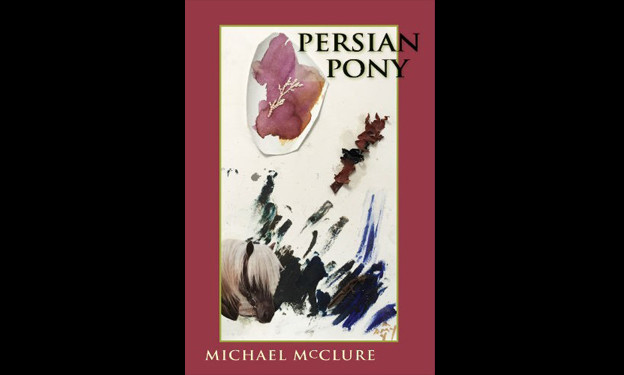Jack Foley: Michael McClure's 'Persian Pony'
A review and tribute

Published by Ekstasis Editions, 2017
In his great poem, “Out of the Cradle Endlessly Rocking” (1859), Walt Whitman constantly seeks a name for the kind of language he has invented for his complex, multivoiced, multi-selved poem, resonating with echoes from the Bible (particularly the Psalms), from the highly theatrical opera of his day — the notion of the “aria” is central to the piece — even from the world of the newspaper, which was one of the places in which Whitman developed his understanding of writing. The term he chooses for this language, which is alive with the notion of performance, is not verse or poetry or prose or prose poetry — the term “free verse” was not available to him — but song. This notion of song was a redefinition of the possibilities of language in a specifically American context. In his extraordinary essay, “Projective Verse” (1950), Charles Olson extends Whitman’s insights into techniques partially gleaned from the French Symbolist movement, in which the silence and whiteness of the page is not neutral but an active element in the meaning of what the poet intends. In addition, breath — the breathing of syllables — becomes a central issue in the enunciation of the work. Together, Whitman and Olson — with, no doubt, some help from William Carlos Williams, among others — give living poets, and particularly American poets, a medium in which they can find their own erratic, imaginative way.
“Poems in Persian Pony are written in PROJECTIVE VERSE,” writes octogenarian Michael McClure at the outset of his new work: “Projective Verse is neither metrical nor free verse. It gives swift access to the energy of inspiration moving to the Heart where it bounces through the syllable to the Breath and onto the field of composition.” Olson’s notion of “field composition” conjured up the forces active in an electromagnetic field. Paying tribute to Olson in the title of his own book, The Opening of the Field (1960), Robert Duncan immediately changed the meaning of “field” in the book’s first poem: “Often I Am Permitted to Return to a Meadow” (my italics). Both senses of “Field” —electromagnetic, meadow — are operative in McClure, for whom environmental, “green” issues are a deep concern. “Praise,” he adds, “to my gifted friends who have brought me these awarenesses.”
Persian Pony — the title is taken from a poem by Lorca: “A thousand Persian ponies fell asleep / in the moonlit plaza of your forehead” — is a still exciting exercise in the mode of American verse which Michael McClure has been practicing since the appearance of his first volume in 1956, when the author was in his twenties. Throughout his career, McClure has seen poetry as an exercise in deep awareness. Every individual thing emerges from an all-embracing swirl — “ONCE THIS WAS ALL BLACK PLASMA & IMAGINATION” — but, in the excitement of poetic perception, every individual thing can return to that swirl, every individual thing “is” everything else:
A VULTURE FLIES OVER THE EDGE
of the pine
into an ancient sonata
*
DAZED WITH THE FANTASY
of scents of molecules, atoms, particles,
superstrings, touches of space,
energy, matter, gravity
— stuff clutching with bonds
Z
I
P
P
E
D
into me,
baby me,
ancient me.
It is an amazing stance and, even in 2017 — the year in which McClure turned eighty-five — it continues to produce the shock of the simultaneous assertion of the intensely particular AND the intensely cosmic. One might say that the universe is never absent from a McClure poem, but it is a universe in which every individual thing in it is seen with extreme clarity by a pair of what McClure once called “simple eyes”:
here is
a
Mobius strip
of
stunned clowns
The thrill of Persian Ponies is the thrill of a consciousness which age has not dimmed, though age is acknowledged, and which love continues to inhabit “like chakras where the nerve tubes pass / on the body of the goddess Kundalini”:
Look, the small plane, rattling over,
shakes the petals of the mariposa lily
where the black beetle stands
with his butt in the air.
Soon the salamander will
come out for a stroll
and to enlighten our stare
he’ll leave the prints
of his feet and tail in the dust
and amphibian dreams in the air.
Throughout, Persian Ponies is what Lorca referred to as cante jondo — deep song.
Jack Foley
11/7/18
Poems and poetics